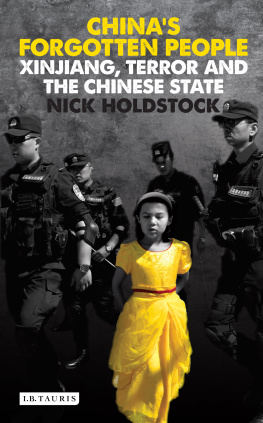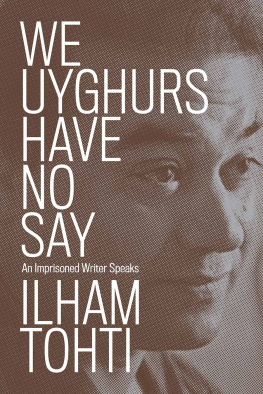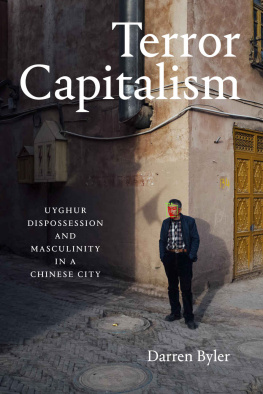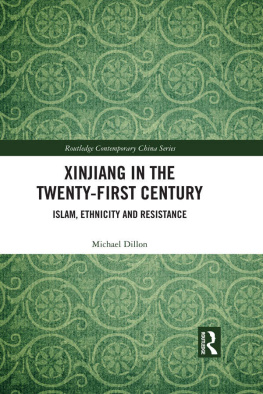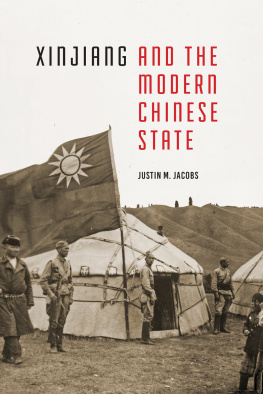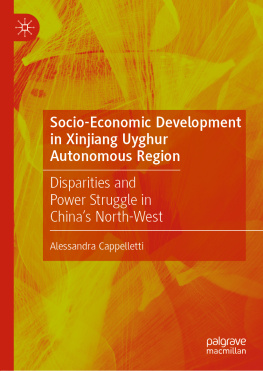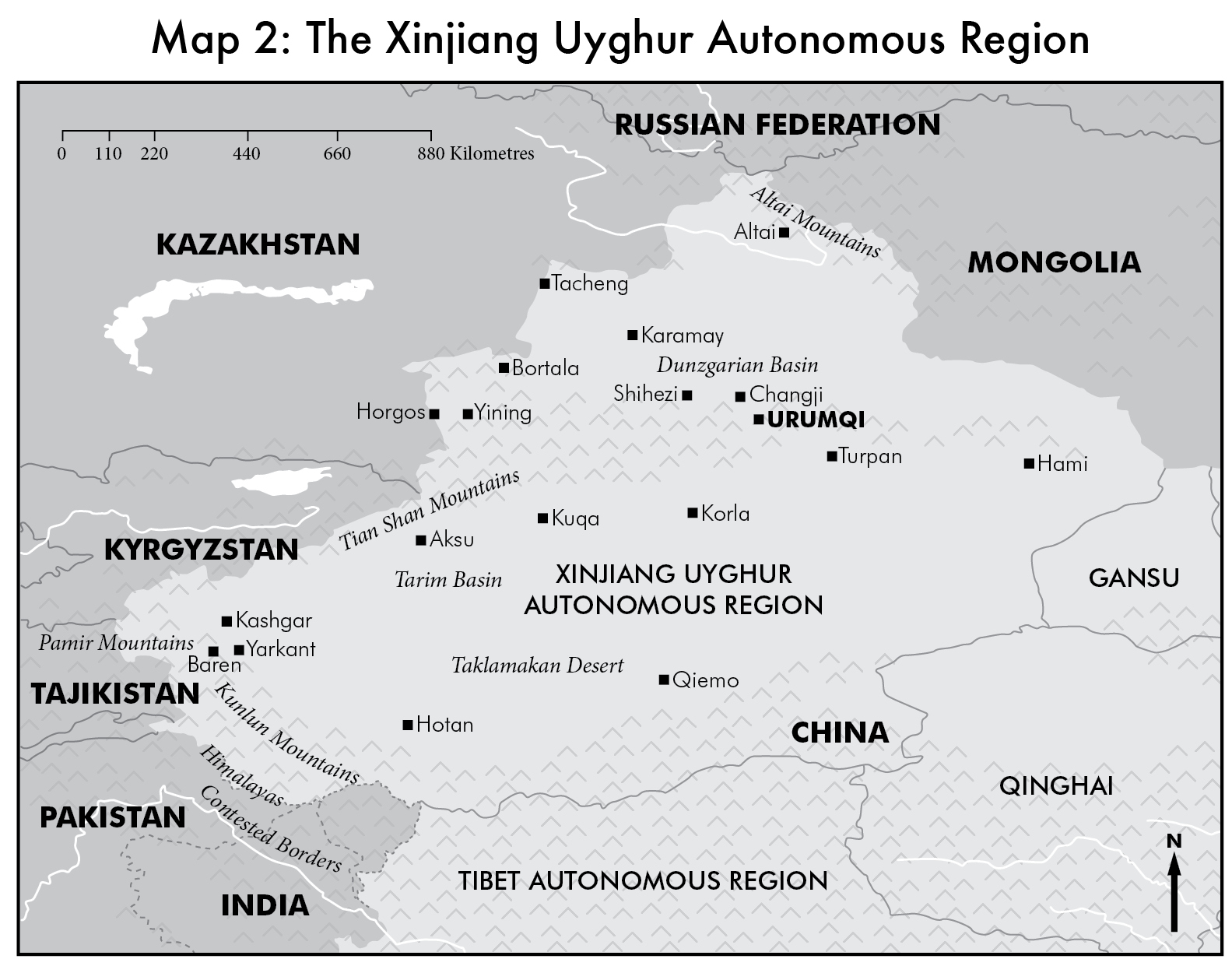Nick Holdstock is a journalist and writer. He has written on Xinjiang for the London Review of Books and his writing can also be found in Vice , the LA Review of Books , n+1 , the Independent , the Dublin Review , the Edinburgh Review , Dissent and Salon.com amongst others. He has worked with Isabel Hilton at China Dialogue part of the Guardian Environment Network. His first novel, The Casualties , is forthcoming from Macmillan US. His first book, The Tree That Bleeds , was about the year he spent living in Xinjiang.
First published in 2015 by
I.B.Tauris & Co. Ltd
London New York
www.ibtauris.com
Copyright 2015 Nick Holdstock
The right of Nick Holdstock to be identified as the author of this work has been asserted by the author in accordance with the Copyright, Designs and Patents Act 1988.
All rights reserved. Except for brief quotations in a review, this book, or any part thereof, may not be reproduced, stored in or introduced into a retrieval system, or transmitted, in any form or by any means, electronic, mechanical, photocopying, recording or otherwise, without the prior written permission of the publisher.
References to websites were correct at the time of writing.
ISBN: 978 1 78453 140
eISBN: 978 0 85773 815
A full CIP record for this book is available from the British Library
A full CIP record is available from the Library of Congress
Library of Congress Catalog Card Number: available
Text design, typesetting and eBook by Tetragon, London
Contents
Even in the best circumstances the position of a minority is uneasy.
Albert Hourani
A History of the Arab Peoples
A Note on Place Names
This book is about a contested region; choosing what to call it is thus a political issue. For some, the use of Xinjiang endorses Chinas claims to the territory, just as the use of East Turkestan is often taken to support the idea that the region should be independent. Perhaps the most neutral choice is to refer to the region by its current legal name: the Xinjiang Uyghur Autonomous Region (XUAR). However, to avoid littering the text with acronyms, or having to repeat these four words many times a page, I have opted to abbreviate this to Xinjiang. My choice of other place names reflects what I take to be the convention in scholarly and media discourse, and should not be taken to indicate any particular political stance on which is the correct name. Hence in some cases I use the Chinese name for a place (such as Yining, rather than Ghulja, its Uyghur equivalent), whereas in others I opt for its Uyghur name (such as Kashgar rather than Kashi).
Introduction
It was a cool, dry Saturday night in the city of eternal spring. Kunming, the capital of Chinas south-western Yunnan province, has a pleasant climate and is popular with both Chinese and foreign tourists for its scenery and local culture. On 1 March 2014 its main railway station was bustling with thousands of people: some of them visitors to the city, others students and migrant workers returning to their jobs in distant cities after Chinese New Year. Given the large volumes of human traffic that Chinas stations have to deal with, its unsurprising that most offer little in the way of welcome or comfort. The ticket halls, waiting rooms and entrance halls are vast stone-floored spaces whose ceilings can seem as distant as those of cathedrals. Theres little natural light; train information is written in red neon. Bells ring; gates are opened; tunnels and overpasses fill with a sudden crush. To gain access to the platforms one needs to pass through a ticket check and a security inspection, but the station forecourt and ticket hall are open to anyone. The entry and exit of so many people, at all times of day and night, mean that theres a constant minor chaos.
Kunmings main railway station is no different. With so many people coming and going, its unsurprising no one paid much attention to the eight mask-wearing figures in black clothes who appeared outside shortly after 9 p.m. Even if someone had taken notice, its unlikely they would have thought them cause for concern: though protests and riots in China are far from rare, there is relatively little violent crime.
So when the masked figures produced long knives from their dark clothing and started attacking people outside the station, it must have been hard to believe. A man working in a nearby shop recalled: Two women said to me, Theres fighting outside, theyre killing people. I said, Dont talk nonsense, its very safe here. But people really were being killed.
Once people realised what was happening they tried to escape. Over 100 people sought refuge in the Chongqing Restaurant; some had to stand on the tables: They were terrified and crying. Some couldnt even speak, said the owner later.
Others attempted to find safety in the station. A student in the ticket hall recalled: There were still many people lined up to buy tickets, and the people came pouring in shouting Murder!
Wang Ji and an old school friend of hers, Mr Cao, were also in the ticket hall. They had just collected their tickets when the attackers entered. The first thing Mr Cao saw was a man in a mask holding a long knife: He came in and immediately hacked a man in the neck [] As soon as that person collapsed, he moved on and stabbed someone else.
Cao and Wang fled, but there was only one exit; the man slashed Wangs head as she ran. They went to the closest hospital, but by the time they got there it was already full of the wounded.
Not everyone managed to escape. One man from the distant north-eastern city of Harbin described how his mother was caught: She tripped over a chair. I failed to pull her up. One attacker thrust a knife into my mothers throat. Instead of pulling it out, he drew another knife he had with him and continued to chop her.
Another victim was 59-year-old Xiong Wenguang. He and his wife Chen Guizhen were migrant workers from the Yunnan countryside who had come home for the New Year holidays. Their train to Zhejiang province in the east wasnt due to leave until next morning, but because they couldnt afford a hotel they thought it best to wait in the station. When Xiong saw a man with a long knife coming towards them, he pushed Chen out of the way, saving her at the cost of his own life.
The attackers moved through the station, from victim to victim, killing indiscriminately. Liu Guilin, who runs a cramped, windowless shop whose metal shelves are packed with instant noodles and snacks, afterwards described the chaos: Two men were killed right in front of me, one had his throat cut, the other [was stabbed] in the chest. There was blood everywhere.
Liu was one of a small group of men who managed to defend themselves with metal parasols, steel rods and fire extinguishers. Another man, nicknamed Big Buffalo for his height, also fought off the attackers successfully.
It took the armed police almost 20 minutes to arrive. By then 29 people were dead, and over 140 were wounded. When the police did enter the station, they shot and killed four of the attackers, but the other four escaped. The wounded were taken to hospital. The authorities quickly sealed off the station. Photos posted online of the scene showed scattered luggage, pools of blood, the grieving and the dead.

